Common chemicals used to clean floors include ammonia, bleach, and hydrogen peroxide. Vinegar and isopropyl alcohol are also widely used for their disinfecting properties.
Keeping floors sparkling clean is essential for both hygiene and appearance. The choice of chemical largely depends on the type of flooring and the nature of the dirt or stain. For instance, bleach is effective for deep disinfection and stain removal on non-porous surfaces but could damage hardwood floors.

When it comes to floor cleaning, people often wonder, “What Chemical is Used to Clean Floors?” One popular choice is vinegar, known for its gentle yet effective cleaning properties without leaving harmful residues. This makes it suitable for various floor types.
On the other hand, isopropyl alcohol is an excellent option for sanitizing and tackling tough grease marks. Recently, the cleaning industry has witnessed a surge in eco-friendly and biodegradable alternatives, offering a safe choice compared to traditional chemicals.
Proper floor maintenance not only contributes to a healthier environment but also prolongs the life of the flooring.
Learn to Clean Floors
A sparkling floor can transform a room from drab to fab. Keeping floors free from dirt and grime does more than just make them look good; it creates a safer, healthier environment for everyone. Choosing the right cleaning solution is a key step in the process.
The Importance Of Maintaining Clean Floors
Clean floors make an immediate impression. They contribute to a home’s overall aesthetic and its inhabitants’ well-being. Dirt and bacteria can accumulate on floors. Regular cleaning prevents this buildup. This is essential for homes with kids and pets that spend time on the floor.
- Reduces allergens that can cause health issues
- Prevents the spread of germs and bacteria
- Enhances the longevity of flooring materials
- Provides a safe walking surface by reducing slips and trips
An Overview Of Chemical Cleaners Versus Natural Alternatives
The battle of chemical cleaners against natural alternatives is ongoing. Chemical-based solutions often promise a deeper clean, thanks to potent ingredients designed to tackle stubborn stains and disinfect surfaces.
Natural cleaners, on the other hand, boast a gentler approach, safer for both humans and the environment.
| Chemical Cleaners | Natural Alternatives |
|---|---|
|
|
Ammonia, bleach, and detergents are common in chemical cleaners. Natural alternatives often include vinegar, baking soda, and essential oils. The choice depends on personal preference, safety concerns, and the type of flooring.
Types Of Chemical Floor Cleaners
Choosing the right chemical to clean floors is crucial. The chemistry behind these cleaners affects their efficiency and safety. This helps select the proper cleaner for a particular type of floor and soiling.
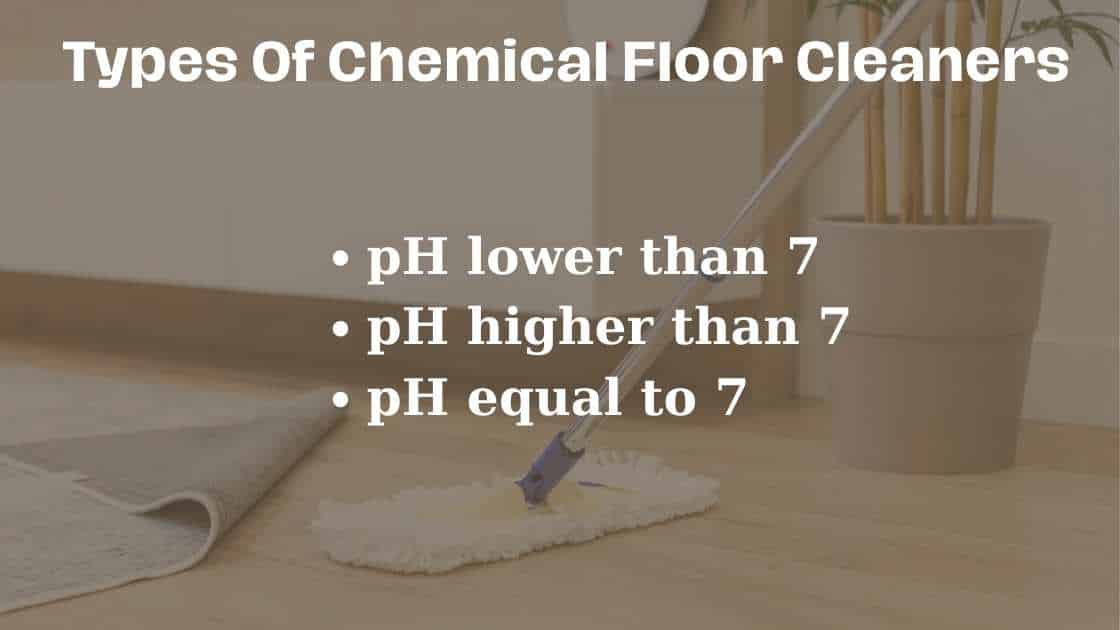
Ph Scale And Its Relevance To Floor Cleaners
The pH scale measures how acidic or basic a liquid is. It ranges from 0 to 14. A pH of 7 is neutral, meaning it’s neither acidic nor alkaline. Below 7 indicates acidity and above 7 indicates alkalinity.
- pH lower than 7: Good for removing rust, minerals, and other non-organic substances.
- pH higher than 7: Effective for cutting through grease, oils, and organic materials.
- pH equal to 7: These cleaners are gentle and ideal for general use.
Classification Of Chemical Cleaners: Alkaline, Acidic, And Neutral
Chemical floor cleaners fall into three main categories based on their pH levels. This classification helps determine their suitability for different cleaning tasks.
| Type of Cleaner | pH Range | Common Uses |
|---|---|---|
| Alkaline Cleaners | pH above 7 | Grease, oil, and organic matter removal |
| Acidic Cleaners | pH below 7 | Mineral deposits, rust, and stains |
| Neutral Cleaners | pH around 7 | Safe on most surfaces, everyday cleaning |
Common Chemicals Used In Commercial Floor Cleaners
In the bustling world of commercial cleaning, The chemicals that keep floors spotless are essential.
Diverse chemicals cater to different types of grime and flooring materials, each with unique properties. Here’s a look at the commonly trusted agents used in many commercial floor cleaners.
Alcohols: Efficacy And Safety
Alcohols, such as isopropanol and ethanol, are top choices for cleaning floors. They evaporate quickly, leaving no residue. Due to their antimicrobial properties, they’re effective in sanitizing surfaces. While generally safe, they can be flammable and should be used in well-ventilated areas.
Ammonia-based Cleaners: Pros And Cons
Ammonia-packed cleaners are known for their streak-free shine on hard surfaces. They cut through the grease with ease, a benefit for heavy traffic floors.
Ammonia can be harsh on the senses and may irritate if not used cautiously.
Bleach As A Disinfecting Agent
Bleach is a powerhouse against germs and tough stains. It’s widely used in healthcare settings for its disinfecting qualities. But, bleach must be diluted correctly to prevent damage to floors and to be safe for users. It’s important to use bleach with care and proper protective equipment.
Eco-friendly And Natural Cleaning Solutions
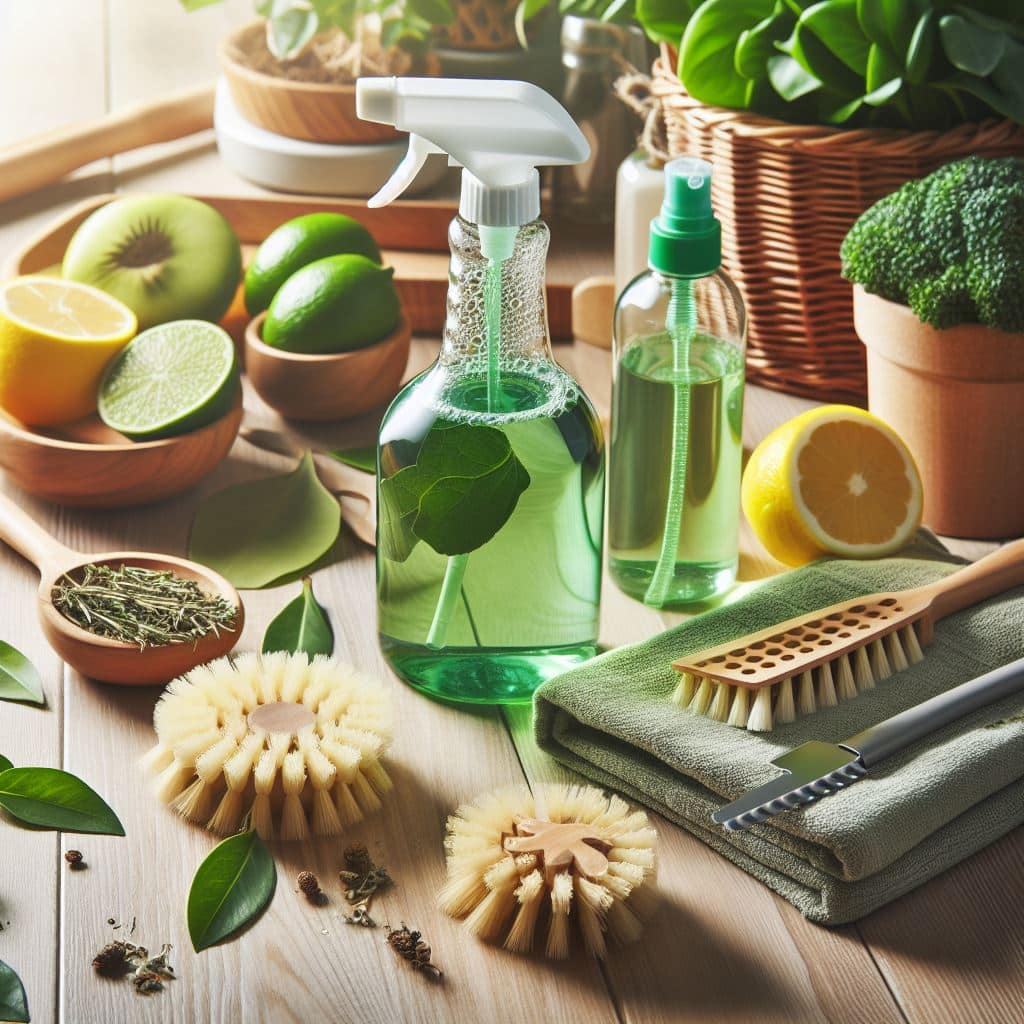
Keeping floors clean is vital for a healthy environment. Yet, many chemical cleaners are harsh on the planet.
People are turning to eco-friendly and natural cleaning solutions. These are safer for our homes and the earth.
Vinegar: A Natural Disinfectant
Vinegar is a powerhouse in the natural cleaning world. It’s made from distilled ethanol. The acetic acid in vinegar kills germs and bacteria. It’s excellent for mopping floors. Mix equal parts of water and vinegar. For an even eco-friendly approach, reuse empty spray bottles to apply the solution.
Citrus Oils And Their Cleaning Properties
Citrus oils, like lemon or orange, naturally cut through grease and grime. They are known for their antimicrobial traits. Add a few drops of citrus oil to your floor cleaning mix to naturally freshen and disinfect.
Baking Soda: Gentle Abrasive And Deodorizer

Baking soda does more than just bake. It’s a non-toxic scrub for stubborn floor stains. It also neutralizes odors. Sprinkle baking soda on the floor. Scrub with a damp mop. It’s safe for you and the environment.
Selecting The Right Cleaner For Different Floor Types
Finding the perfect chemical cleaner for your floors starts with knowing your floor type. Each floor demands a specific approach to maintain its beauty and durability.
By selecting the right cleaner for different floor types, you can prevent damage and keep your floors sparkling clean. Let’s drop into the specifics of each kind of floor.
Ceramic And Porcelain Tile Floors
Ceramic and porcelain tiles work well with gentle, pH-neutral cleaners. These options avoid harming the glaze. Acidic or abrasive cleaners can dull the tiles’ shine. For daily cleaning, a simple solution of warm water and dish soap is effective. For deeper cleans, opt for a manufacturer-recommended tile cleaner.
| Cleaning Frequency | Recommended Solution |
|---|---|
| Daily/Weekly | Warm water + Mild dish soap |
| Monthly/Deep Clean | Specific tile cleaner or diluted vinegar (sparingly) |
Hardwood And Laminate Floors
Hardwood and laminate floors require cleaners that don’t leave residue. Water-based solutions are usually the best bet. Look for “hardwood friendly” on labels.
Avoid using excess water, as it can cause warping. Use microfiber mops for the best results, and consider a recommended hardwood floor cleaner.
- Daily Cleaning: Dust with a microfiber cloth.
- Spill Response: Immediate wipe with a damp cloth, no dripping.
- Periodic Maintenance: Use designated hardwood or laminate cleaner.
Carpets And Rugs: Special Considerations
Carpet and rug cleaning demands a delicate touch. Use cleaners designed for soft flooring. They should lift dirt without damaging fibers.
For spills, blot—don’t rub—and use a dedicated carpet cleaner for spot treatment. A professional deep clean or steam is suggested yearly.
- Spot clean spills immediately with a carpet-specific solution.
- Regular vacuuming maintains the carpet’s condition.
- Schedule annual professional cleans for overall freshness.
Safety Measures And Best Practices In Chemical Application
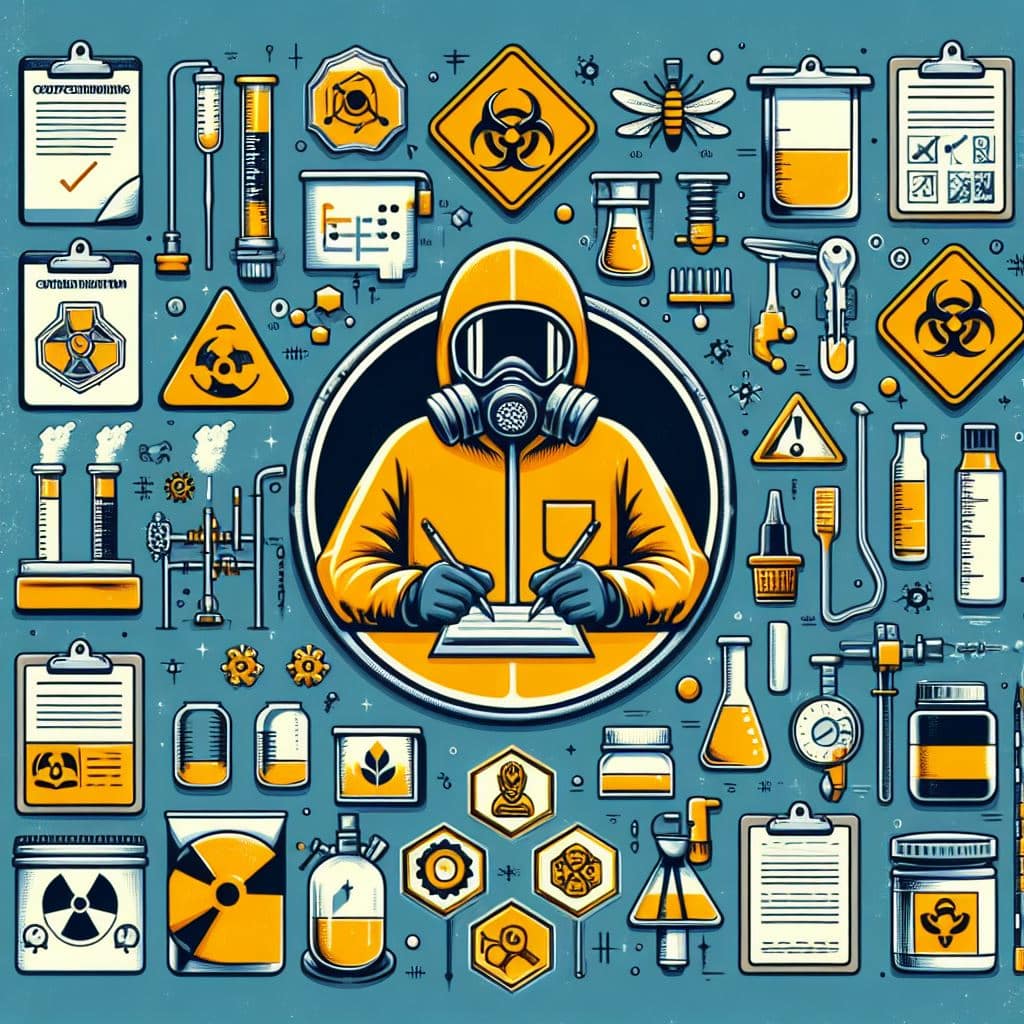
Cleaning floors with chemicals keeps our spaces hygienic and pleasing. Yet, utmost care is essential during application.
Safety measures and best practices ensure protection for both the individual using the chemicals and the environment. Let’s discover the right approaches to apply these substances safely.
Using Personal Protective Equipment
Personal Protective Equipment (PPE) shields users from exposure. Wearing gloves, long sleeves, and safety goggles prevent skin and eye contact. Properly fitted PPE is a must before starting the cleaning process.
Gloves: Avoid skin irritation and burns
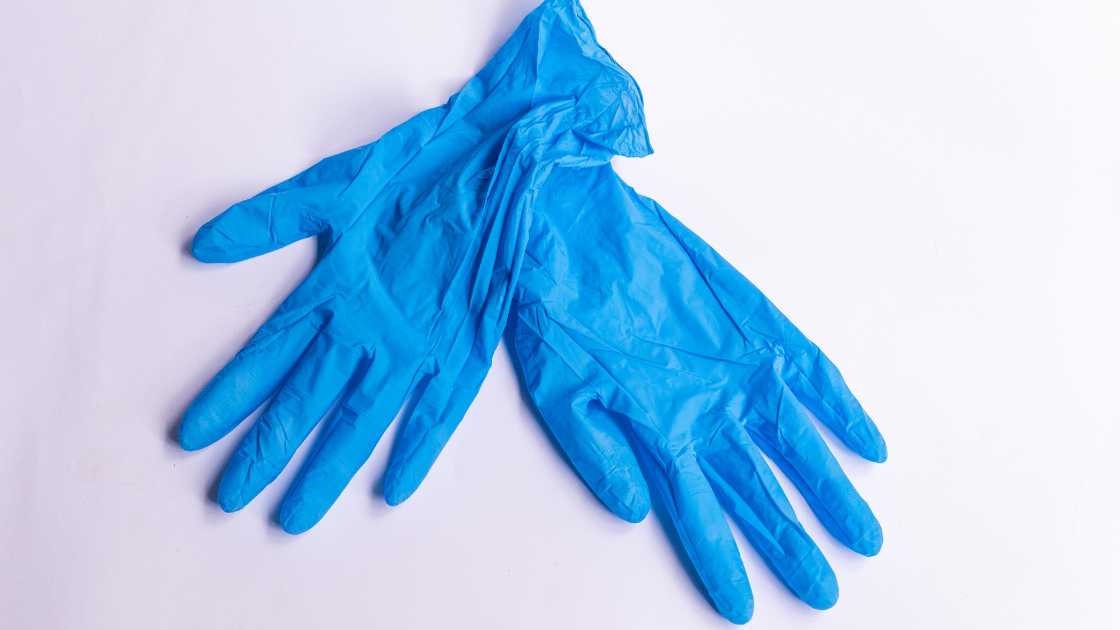
Mask: Prevent inhalation of fumes

Goggles: Protect eyes from splashes

Proper Dilution And Application Techniques
Correctly diluting cleaning agents is critical. High concentrations can damage surfaces and pose health risks. Follow the manufacturer’s guidelines for optimal results.
- Measure chemicals accurately
- Mix with the right amount of water
- Apply with appropriate tools like mops or clothes
Disposal Of Chemical Cleaners: Environmental Concerns
Disposal of cleaners must not harm the environment. Drainage systems are not always safe for all chemicals. Local regulations typically dictate the correct disposal methods.
| Type of Chemical | Recommended Disposal Method |
|---|---|
| Acidic Cleaners | Follow community hazardous waste programs |
| Phosphates | Use eco-friendly waste services |
| Ammonia | Dilute and flush if water-soluble, else treat it as hazardous |
Future Trends In Floor Cleaning Chemicals
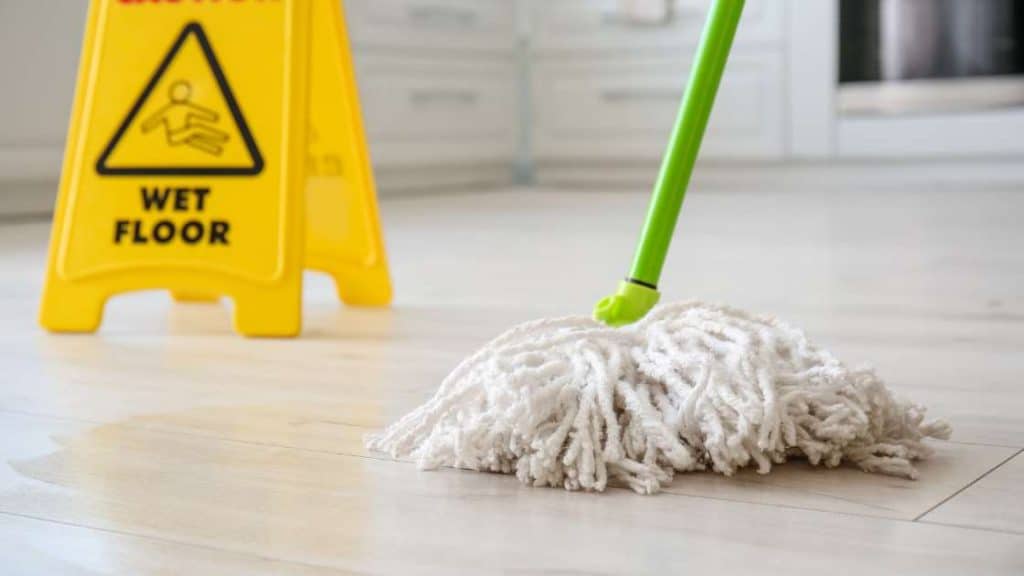
The world of floor cleaning is ever-evolving, with new chemicals and technologies surfacing regularly. As we look towards the future, certain trends are shaping the way we clean floors.
The efficiency and sustainability of the products we use are more important than ever. Let’s drop into the future of floor-cleaning chemicals and discover the exciting improvements on the horizon.
Innovations In Chemical Formulations
Innovative chemical solutions are changing floor cleaning. Manufacturers are now focusing on powerful yet safe ingredients.
These include enzymes and microbes that work to break down dirt at a molecular level, promising a deeper and more efficient clean without harsh chemicals.
Expect to see smart formulas that respond to different types of flooring and levels of soiling, optimizing their cleaning prowess.
The Rise Of Green Cleaning Products
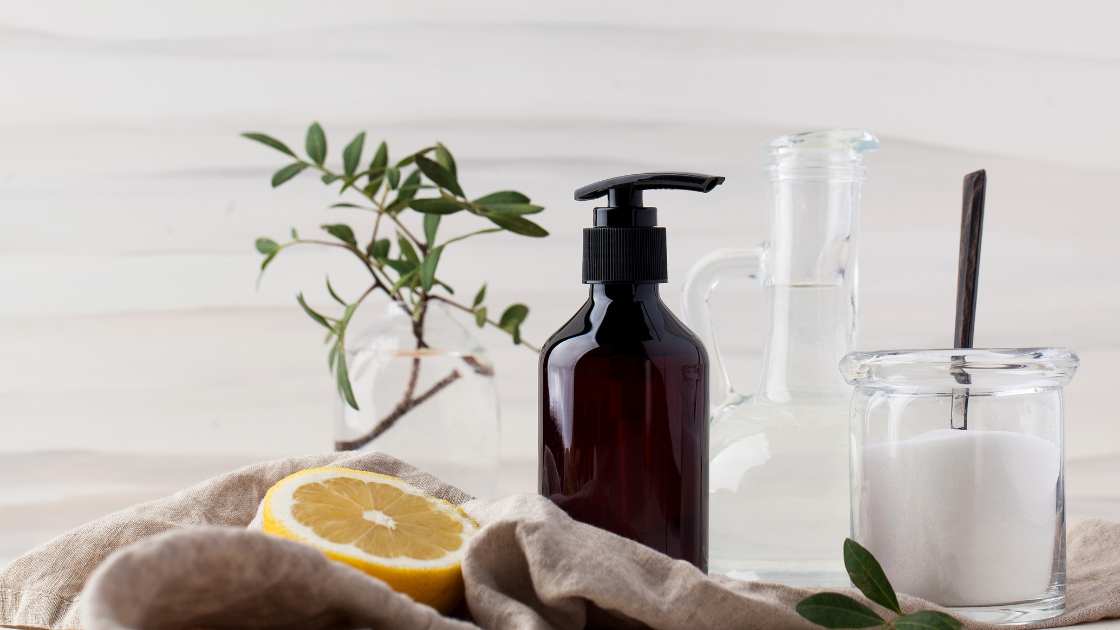
Environmental concerns are driving the adoption of eco-friendly cleaning products. These products limit harmful emissions and reduce pollution.
Many are made from renewable resources, sporting biodegradable packaging, and focusing on minimal environmental impact. Look for certifications like Green Seal or EcoLogo to ensure you’re choosing products that are safe for the planet.
- Plant-based cleaners
- Non-toxic ingredients
- Reusable containers
Technological Advancements In Cleaning Applications
Technology is revolutionizing the application of floor-cleaning products. Automated machines and robots can now dispense chemicals in a precise and controlled manner, enhancing efficiency and reducing waste. Dosing systems and microfiber technologies are also promoting smarter use of chemicals, ensuring just the right amount is used for an effective clean.
| Technology | Benefits |
|---|---|
| Automated Dispensers | Accuracy, Waste Reduction |
| Robotics | Consistency, Labor Efficiency |
| Microfiber Tech | Less Chemical, More Clean |
Frequently Asked Questions For What Chemical Is Used To Clean Floors
What Chemicals Are In Floor Cleaner?
Floor cleaners often contain surfactants, solvents, antibacterial agents, enzymes, fragrances, and pH adjusters. Specific ingredients vary by brand and type of cleaner.
What Do Professionals Use To Clean Floors?
Professionals often use microfiber mops, commercial-grade vacuums, steam cleaners, and pH-neutral cleaning solutions to effectively clean floors. They also utilize floor buffers and scrubbers for deep cleaning and polishing.
Which Chemical Is Used For Floor?
For cleaning floors, people commonly use diluted bleach, ammonia, or specially formulated floor cleaners.
What Is A Floor Cleaner Chemical Used For In A Kitchen?
A floor cleaner chemical for kitchens efficiently removes grease, spills, and stains, ensuring a hygienic cooking space. It sanitizes surfaces to prevent bacterial growth.
Which chemical is best for floor cleaning?
The choice of the best chemical for floor cleaning depends on the type of flooring material. For example, a mild pH-neutral cleaner is generally suitable for most surfaces, while specific floor types like hardwood may require specialized wood floor cleaners to maintain their integrity and finish.
Is bleach good for cleaning floors?
Yes, bleach can be effective for cleaning floors as it has strong disinfectant properties that can eliminate germs and bacteria. It’s vital to use bleach in appropriate dilutions and follow safety guidelines to ensure its efficacy without causing harm to surfaces or individuals.
Conclusion
Selecting the right chemical to clean your floors improves both hygiene and longevity. It’s essential to match the cleaner to your surface type and cleaning needs. Remember, safety comes first—always follow manufacturer guidelines. For a sparkling clean without damage, choose your floor cleaner wisely.

